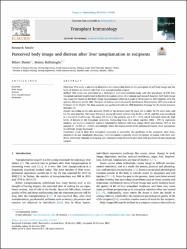| dc.contributor.author | Demir, Bilsev | |
| dc.contributor.author | Bülbüloğlu, Semra | |
| dc.date.accessioned | 2021-11-09T11:48:28Z | |
| dc.date.available | 2021-11-09T11:48:28Z | |
| dc.date.issued | 2021 | en_US |
| dc.identifier.citation | Demirrn, B., & Bulbuloglurn, S. (2021). Perceived body image and distress after liver tansplantation in recipients. Transplant Immunology, 69, 101483. | en_US |
| dc.identifier.issn | 0966-3274 | en_US |
| dc.identifier.issn | 1878-5492 | en_US |
| dc.identifier.uri | 10.1016/j.trim.2021.101483 | |
| dc.identifier.uri | https://hdl.handle.net/20.500.12899/453 | |
| dc.description.abstract | Objectives: This study's aim was to determine the relationship between the perception of self-body image and the level of distress in patients who had liver transplantation surgery. Method: This study was performed as a descriptive and cross-sectional study with the attendance of 120 liver transplant patients hospitalized in the liver transplant center of a training and research hospital. Self-body image was measured based on the Body Image Questionnaire (BIQ) on a scale of 40 (lowest) to 200 (highest) with the optimal BIQ score of 135–200. The level of distress was evaluated by the Distress Thermometer (DT) on a scale of 0 (None) to 10 (High). The data analysis was performed with the IBM Statistical Package for the Social Sciences Statistics 25. Results: According to the data attained, 35.8% of the patients were 55 years old or older, 56.7% were male, and 61.7% were married. The mean BIQ score among all tested patients was 81.85 ± 27.31, and this was considered as a low level of self-image. The mean DT score of the patients was 5.45 ± 2.72, which indicated relatively high levels of distress in the transplant recipients. Comparing these two values together (BIQ + DT) by regression analysis, we found a moderate negative relationship between self-body image (BIQ) and distress (DT) in the patients (r: −0.391, p < 0.001). Accordingly, when the distress levels of the patients decreased, their perceptions of self-body image increased. Conclusion: Even if their liver transplant operation is successful, the problems of the recipients after transplantation do not completely disappear. Liver transplant recipients should be helped in coping with their condition effectively. Patients undergoing liver transplantation should be provided with psychosocial and emotional support. | en_US |
| dc.language.iso | en | en_US |
| dc.publisher | Elsevier | en_US |
| dc.relation.ispartof | Transplant Immunology | en_US |
| dc.rights | info:eu-repo/semantics/closedAccess | en_US |
| dc.subject | Body image | en_US |
| dc.subject | Distress | en_US |
| dc.subject | Liver transplantation | en_US |
| dc.subject | Recipients | en_US |
| dc.title | Perceived body image and distress after liver tansplantation in recipients | en_US |
| dc.type | Article | en_US |
| dc.authorid | 0000-0002-5827-8289 | en_US |
| dc.department | MTÖ Üniversitesi, Sağlık Bilimleri Fakültesi, Hemşirelik Bölümü | en_US |
| dc.institutionauthor | Demir, Bilsev | |
| dc.identifier.doi | 10.1016/j.trim.2021.101483 | |
| dc.identifier.volume | 69 | en_US |
| dc.identifier.startpage | 1 | en_US |
| dc.identifier.endpage | 6 | en_US |
| dc.relation.publicationcategory | Makale - Uluslararası Hakemli Dergi - Kurum Öğretim Elemanı | en_US |
| dc.identifier.pmid | 34688881 | |
| dc.identifier.scopus | 2-s2.0-85117778624 | en_US |
| dc.identifier.scopusquality | Q3 | en_US |
| dc.identifier.wos | WOS:000715048000001 | en_US |
| dc.identifier.wosquality | Q3 | en_US |
| dc.indekslendigikaynak | Web of Science | en_US |
| dc.indekslendigikaynak | Scopus | en_US |
| dc.indekslendigikaynak | PubMed | en_US |


















